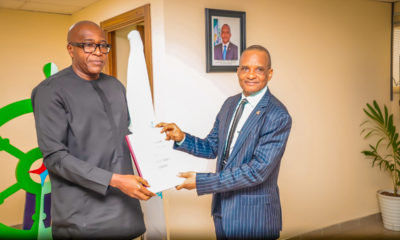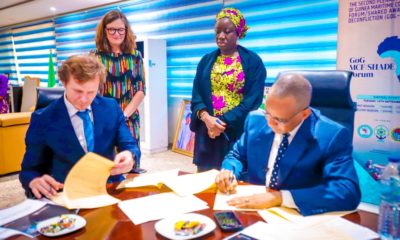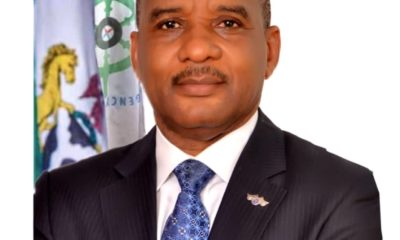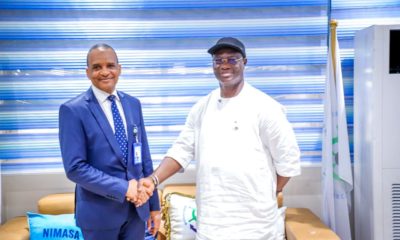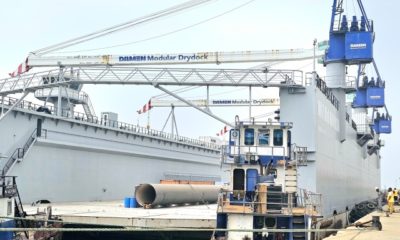Maritime
USCG Offers NIMASA Condition Of Entry Removal Terms
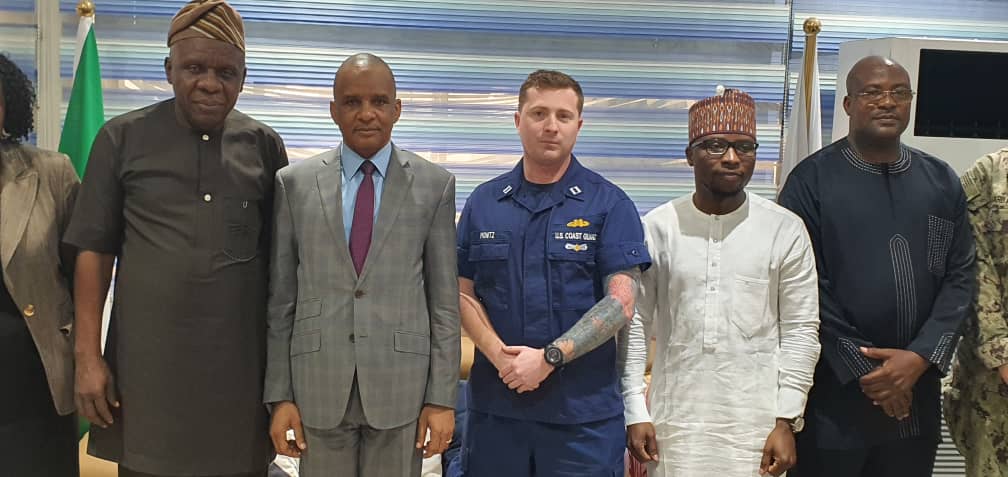
The United States Coast Guard (USCG) has offered Nigeria a three-year plan to work with the Nigerian Maritime Administration and Safety Agency (NIMASA) for the removal of the Condition of Entry (CoE), placed on American-bound vessels from Nigeria.
This was disclosed by Cdr. Juliet Hudson at the USCG headquarters in Washington DC, during a peer review visit by a delegation from the NIMASA.
Hudson announced a bi-annual assessment of compliance level with ISPS implementation at Nigerian Ports working with NIMASA.
In her words, “We will work with NIMASA to review the compliance level of Ports in Nigeria with the provisions of the ISPS Code. This will be done twice a year to enable us update the Port Advisory Security Portal in the White House after which a decision will be taken to completely lift the Condition of Entry. We commend NIMASA for ISPS implementation and please deliver this award to your DG.”
Meanwhile, Director General, NIMASA, Dr. Bashir Jamoh, received in audience, USCG Advisor, Lt. Benjamin Montz who led a delegation to NIMASA.
Dr Jamoh stated that the Agency would continue to prioritise safety and security on the Nigerian waters ways in order to realise the mandate of the Blue Economy.
While acknowledging the support from the American Government in seeing to the implementation of ISPC in Nigeria, the NIMASA DG noted that any support to Nigeria should be extended to other countries in the Gulf of Guinea.
He said that Nigeria plays a vital role in the Gulf of Guinea (GoG), hence called on the USCG to extend support to countries in the GoG region in order to consolidate the gains of the Deep Blue Project in the region, whilst also bolstering the existing ties in the region.
“Nigeria is a major stakeholder in the Gulf of Guinea; you will agree with me that most of the activities in the region revolves around Nigeria.
“We acknowledge the support you have been giving us; we request that you extend it to other countries in the GoG, as a chain is only as strong as its weakest link, and all credit goes to the United States Government”. Dr Jamoh said.
Speaking further, the NIMASA helmsman called on the USCG to assist in the area of training the Agency’s personnel, noting that a gap analysis will be done, and then synchronise with the USCG in order to give the right training to the right personnel.
Earlier in his remarks, the leader of the delegation from the USCG, Lt. Benjamin Montz noted that they are in Nigeria as part of their plans to support the Agency in the area of training, while also collaborating with Agency to improve safety and security in the country’s maritime sector, with particular reference to port operations in Nigeria.
The NIMASA is the Designated Authority responsible for the implementation of the International Ships and Ports Security (ISPS) facility code in Nigeria.
Over the years, the Agency has continued to collaborate with relevant stakeholders to achieve its mandate, with the United States Coast Guard providing the required support and assistance towards the realisation of safer and more secured waterways in Nigeria, and by extension the Gulf of Guinea.
Maritime
Shettima Urges Stronger Synergy Among MDAs For Nigeria’s Business Environment

The Vice President of the Federal Republic of Nigeria, Senator Kashim Shettima, has called on Ministries, Departments, and Agencies (MDAs) of government, as well as members of the Presidential Enabling Business Environment Council (PEBEC), to deepen collaboration so as to foster a more conducive environment for doing business.
He made the assertion in Abuja, at the closing session of the PEBEC Retreat for heads of MDAs and MDA Reform Champions.
According to Sen Shettima the overarching goal is to ensure Nigeria remains a preferred destination for investors.
ALSO READ: SNEPCo, Former MD Aiboni Win Energy Times’ Awards
He stated, “This retreat was convened by the Presidential Enabling Business Environment Council (PEBEC), an institution I am privileged to chair, not just to review reform progress, but to deepen something even more critical: synergy.
The business of government is too complex to be solved in silos. We cannot afford the luxury of working in isolation, while the problems we are tasked to solve are increasingly intertwined.”
Among the attendees was the Director General of the Nigerian Maritime Administration and Safety Agency (NIMASA), Dayo Mobereola, who commended PEBEC for organizing the retreat.
He noted that it provided a valuable platform for peer review and constructive engagement among Federal Government appointees, aimed at improving institutional performance and reform delivery.
Maritime
NIMASA Dangles Opportunities Before Private Investors At Enugu Int’l Trade Fair
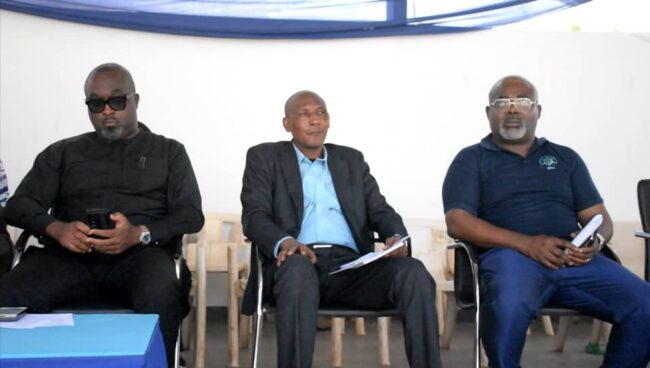
The Nigerian Maritime Administration and Safety Agency (NIMASA) has urged the private sector to seize emerging opportunities in Nigeria’s Blue Economy, particularly in the maritime sector.
The Director General of NIMASA, Dr. Dayo Mobereola made the call at the ongoing 36th Enugu International Trade Fair.
The NIMASA DG who was represented by the Deputy Director in the Planning Research and Data Management Service Department of NIMASA, Umar Mohammed highlighted NIMASA’s commitment to implementing the Renewed Hope Agenda of the Federal Government, while also emphasizing the need for inclusive economic growth through indigenous participation in domestic and international shipping.
ALSO READ: Shell Commends Oloibiri Lecture Series As Platform For Change
“To unlock the full potential of our maritime economy, NIMASA is pursuing an integrated development strategy that will support indigenous operators in ship acquisition, establish a National Carrier Line, and create maritime training institutions for world-class seafarers,” he stated.
He noted that the Agency is also implementing a Public Sector Cargo Support Programme aimed at creating a captive freight market for local carriers and reducing the dominance of foreign shipping lines in Nigeria’s seaborne trade.
Accordingly, he said the Agency’s strategic initiatives are being driven through public-private partnerships to ensure sustainability and long-term impact.
“Therefore, we are inviting investors and entrepreneurs to collaborate with us in developing a robust and competitive maritime sector that will create jobs and boost the national economy,” he added.
The NIMASA DG through his representative used the opportunity to express appreciation to the Governor of Enugu State, Dr. Peter Ndubuisi Mbah, and the leadership of the Enugu Chamber of Commerce, Industry, Mines and Agriculture (ECCIMA) for hosting the trade fair, which he described as a vital platform for business networking and investment drive.
The NIMASA plays a key role in promoting the Blue Economy in Nigeria with its promotional responsibilities, being part of its mandate to regulate maritime activities and ensure sustainable use of ocean resources.
Maritime
Nigeria Moves For Joint Maritime Task Force For Gulf Of Guinea
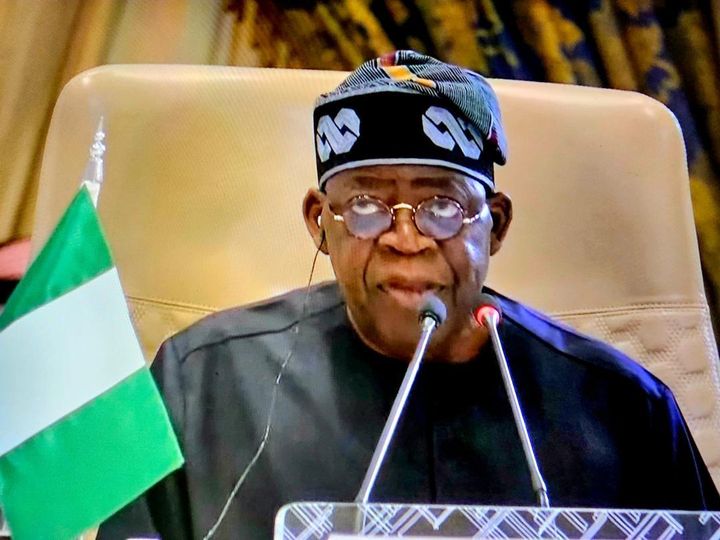
Nigeria’s President, Bola Ahmed Tinubu has tabled a motion for the establishment of a combined maritime task force to enhance security in the Gulf of Guinea before the Africa Union Peace and Security Council (AUPSC).
He made the call at the 38th Ordinary Session of the Assembly of the African Union (AU) Heads of State and Government in Addis Ababa, Ethiopia, on Sunday.
To give effect to the motion, President Tinubu expressed Nigeria’s readiness to host the task force’s headquarters in Lagos.
ALSO READ: Tinubu Calls For African Credit Rating Agency
President Tinubu conveyed Nigeria’s position as the AU considered the report on the AUPSC, focusing on peace and security in Africa, and the biennial report on the implementation of the Master Roadmap of Practical Steps to Silence the Guns in Africa (2023-2024).
The statement was delivered on behalf of President Tinubu by the Minister of Foreign Affairs, Ambassador Yusuf Tuggar.
“The time has come for the African Union Peace and Security Council to prioritise the creation of a Combined Maritime Task Force for the Gulf of Guinea.
“I wish to announce that Nigeria would like to host the headquarters of the task force in Lagos,” he said.
Nigeria’s recommendation of a maritime task force comes on the same day that it signed an agreement with the AU to provide Strategic Sea Lift Services for AU peace support operations, natural disaster support, humanitarian actions, and personnel movement.
It was gathered that Nigeria’s defence minister, Badaru Abubakar, signed the agreement.
Under the agreement, the Nigerian Navy will provide a vessel for the operations on a cost-recovery basis.
Nigeria’s Attorney-General and Justice Minister, Prince Lateef Fagbemi, Minister of Foreign Affairs, Ambassador Yusuf Tuggar, Naval Chief, Vice Admiral Emmanuel Ikechukwu Ogalla, and Director-General of the Nigerian Intelligence Agency, Ambassador Muhammed Muhammed, witnessed the agreement signing.
Ambassador Bankole Adeoye, the AU Commissioner for Political Affairs, Peace and Security, signed for the AU.
President Tinubu expressed satisfaction that the AUPSC had already adopted the outcomes of a high–level meeting, including the decision to upgrade the Nigerian National Counter-Terrorism Centre to a Regional Counter–Terrorism Centre.
He also appreciated the Peace and Security Council’s decision to renew the mandate of the Multinational Joint Taskforce, addressing the twin challenges of terrorism and violent extremism in the Lake Chad Region.
On Libya, the Nigerian leader expressed concern that the instability in the North African country has continued to worsen security challenges in the Sahel and called on the Assembly to back initiatives to restore law and order.
“The Sahel cannot enjoy peace as long as Libya does not,” he warned.
President Tinubu highlighted the severe insecurity affecting countries grappling with democratic transition, including Sudan, Burkina Faso, Mali, Niger, South Sudan, and Gabon.
“It would not be out of place to explore the possibility of extending the inherent benefits of UN Security Council Resolution 2719 to support AU Peace Support Operations,” he said.
In doing so, he added that the AU must try to prevent the increasing incursion of extra-continental forces, including private military companies, into African security matters.
President Tinubu welcomed the progress in operationalising the African Standby Force, reiterating Nigeria’s support.
He appealed to all AU member countries and delegations to show the necessary flexibility and allow the draft MoU on the operationalisation of the standby force to be adopted.

